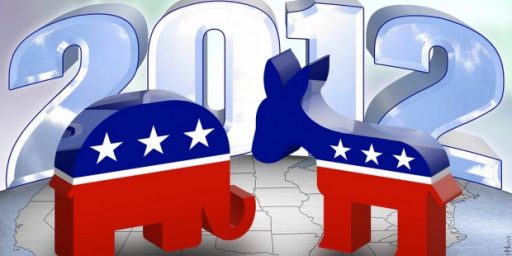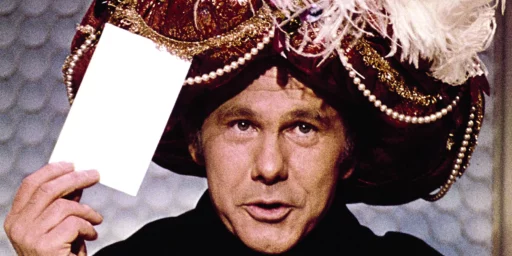The Original “L Word”
David Adesnik of OxBlog finds Nancy Pelosi running away from the term “liberal” in the run-up to the November elections.
The president’s approval rating hasn’t seen the brighter side of 50% in years. Confident liberals installed Howard Dean as chairman of the Democratic party and threw their weight behind a successful anti-Lieberman insurgency. So, has the day finally arrived when the Democratic leadership is no longer afraid of the “L-word”?
Apparently not.
The question is whether this strategy will be effective:
Now, one could argue that this is good strategy. Polls consistently show that there aren’t enough self-identified liberals to put the Democrats over the top.
But if the Kos-Dean-Lamont message is that Democrats must get tough, can they do so while rejecting a label in public that almost all of them would [embrace] in private? Can you be assertive if you don’t have a clear identity? Or is putting on a different face for the cameras just part of being tough?
I generally agree that the Democrats have to make this election about competence and policy rather than ideology to win; while there are probably more liberals in the electorate than people willing to wear the “liberal” label, realistically the Democrats will need to demobilize traditional Republican voters and recruit swing voters to have a chance at control of Congress, and neither of these groups are likely to be excited by a wholehearted embrace of the “L word.”
Then again, this is the party that tossed Joe Lieberman aside and turned a safe seat in Connecticut into a toss-up, at least in terms of who the winner is likely to caucus with, so it’s not entirely clear this message has gotten through to the base.




I think you fail to recognize that “liberalism” is, almost by definition, less of an ideology that is conservatism.
Conservatives have a primary mission to protect and defend traditional values and ideas – they are the brake on progress in any society – an often necessary brake, since any society, especially a free society, is always coming up with brilliant new ideas, most of which are not really very brilliant at all. Conservatives function as the great peer review process for political ideas. Thus they have a coherent set of beliefs – an ideology – to defend (basically, the status quo), and by promoting the word “conservative” they can point to exactly what it means.
Liberals are, by definition, on the creative edge of policy. They are the engine of new ideas, the problem solvers, the innovators. At any moment, there is a great diversity of proposals to solve the problems faced by society, and so liberals, writ large, often do not have a single set of consistent proposals to offer.
Liberalism is thus more an attitude than an ideology. Pragmatic problem solving, rather than a rigid set of proposals. Thats why “liberal vs. conservative” is not really a dichotomy between similar categories.
It is the mission of conservative propagandists (seen in action every single day) to find the most wierd and outlandish policy suggestion from the entire sea of independent “liberal” thinkers, and to claim that that idea is the true voice of “liberalism” – as if liberalism was an ideology, and the wierd idea its inevitable consequence. So naturally, liberal politicians shy from the word, because it is used to refer to the great marketplace of policy innovations, and by embracing that, they would be seen to be embracing any and all crazy ideas out on the fringes of that marketplace.
Your comments about the Lieberman race seem weird. That race is not a toss-up at all in terms of how the balance of the Senate will be affected. It is a no-lose situation for the Democrats. Odd though, how Dems who take on Joe, even though the Dems will keep that seat no matter what, are seen as wild-eyed kamikazes, whereas when conservatives go after Chafee (or Spector in years past) – seats that the party would absolutely lose if the extremist got the GOP nod, are never painted as such kamikazes. Why is that?
Well, I always thought that the guys going after Chaffee and Specter were idiots too. As for Lieberman, it’s very much in the air whether or not he will be allowed to stay in the Democratic caucus if he wins–my bet is that if he would make the Senate 51-49 D, he’ll be allowed to stay, but otherwise (no matter who controls the majority) he won’t.
As for the “liberal-conservative” distinction, I think there’s far more policy innovation on the right than the left at present; Democrats seem stuck in a rut of trying to restore (or defend) the New Deal and Great Society without really recognizing the fundamental problems of key aspects of those policies.
I thought it was going to be L-unatic.
I saw this the other day and saved it for (I now know) today. We are, of course, thinking of the new liberal, here, not the old liberal who was reliably sensible.
“Liberalism is a species of nihilism, the denial of meaning in anything outside the self. This explains why the liberal becomes so furious at any religious or patriotic claims upon him, or even any data or event (or rather, at being presented with any data or event) which makes it difficult for him to maintain his (anti-)philosophy. The cases you give are interesting examples of how the liberal simply sectors off vast areas of reality in order to maintain his cozy psychological stability, to make of his mind a kind of intellectual greenhouse.
“Worse yet, from the same necessities of nihilism, the liberal instinctively sides with all destructive forces, whether they be atheism, sexual license, or revolutionary movements. But not mere dictators, who tend to retain at least the trappings of patriotism and traditional authority. The political force must have that destructive zing or it don’t mean a thing. The liberal is however instinctively attracted even to totalitarian regimes, whether Communist or Mahometan, which would mean the death of liberalism. So long as the political force promises the destruction of elements in his own society which he finds constricting precisely because they have profound meanings, he will find himself almost subconsciously but powerfully drawn to it. He can never do otherwise than almost tropistically side with the enemies of the West.”
– Shrewsbury, at VFR, 9/14/06
So true, and so well said. It rings true especially in respect to campus liberals.
“the liberal instinctively sides with all destructive forces, whether they be atheism, sexual license, or revolutionary movements.”
Yo, you talking about Ben Franklin and Thomas Jefferson there. I’m with ’em!
I said “…and saved it for (I now know) today. We are, of course, thinking of the new liberal, here, not the old liberal who was reliably sensible.”
I didn’t think I would have to spell it out that Franklin and Jefferson qualify as “old liberals”.